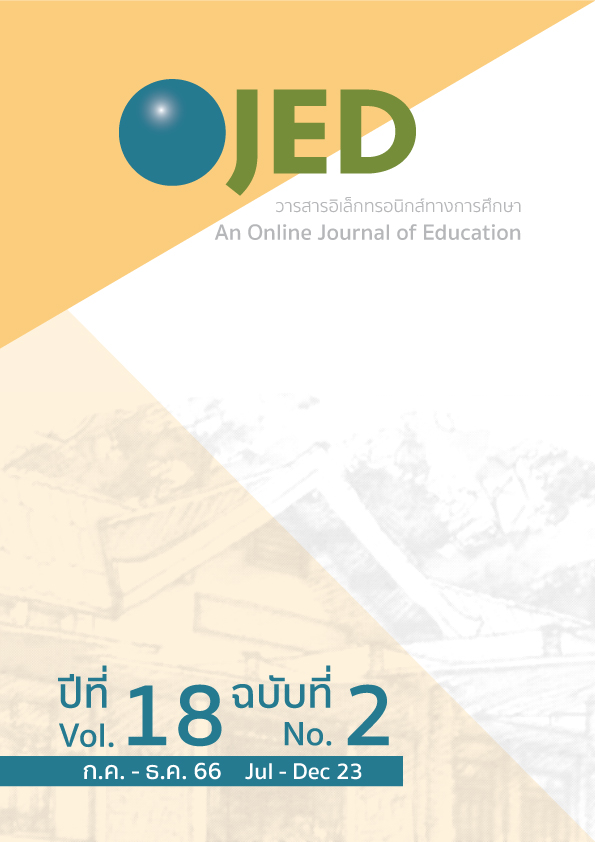The Development of the Mathematics Learning Outcome on Equality of Mathayom 2 Students by Using STAD Technique
DOI:
https://doi.org/10.14456/ojed.2023.15Keywords:
the development of the mathematics learning outcomes, equality, STAD techniqueAbstract
The current research endeavors to develop mathematics learning activities on equality of Mathayom 2 students by using STAD to meet the standard 80/80. Moreover, it aims to compare the mathematics learning outcomes on equality of Mathayom 2 students by using STAD before and after studying. Lastly, its purpose is to study the satisfaction level of Mathayom 2 students on the mathematics learning activities on equality by using STAD. Using random sampling, the sample includes 44 observers, students of an authorized school. Academic year 2022. The research tools include a learning activity plan, tests for Mathematics learning outcomes, and a questionnaire about students’ satisfaction levels. The statistics adopted to analyze the information are the dependent t-test. The research results revealed that the outcome results are considered above standard 85.92/84.77. Next, the comparison of the mathematics learning outcomes before and after studying shows a higher outcome after studying than before, with a statistical significance of .01. Lastly, the overall satisfaction on the mathematics activities is at the highest level with an average of 4.82.
References
ภาษาไทย
กมลชนก เซ็นแก้ว. (2561). การศึกษาผลสัมฤทธิ์ทางการเรียนวิชาคณิตศาสตร์โดยใช้การจัดการเรียนรู้
แบบร่วมมือเทคนิค STAD ของนักเรียนชั้นมัธยมศึกษาปีที่ 1. [วิทยานิพนธ์ครุศาสตรมหาบัณฑิต,
มหาวิทยาลัยราชภัฏกำแพงเพชร].
กระทรวงศึกษาธิการ. (2560). ตัวชี้วัดและสาระการเรียนรู้แกนกลางกลุ่มสาระการเรียนรู้คณิตศาสตร์ (ฉบับ
ปรับปรุง พ.ศ. 2560) ตามหลักสูตรแกนกลางการศึกษาขั้นพื้นฐานพุทธศักราช 2551. กรุงเทพมหานคร : โรงพิมพ์ชุมนุมสหกรณ์การเกษตรแห่งประเทศไทย.
ชัยยงค์ พรหมวงศ์. (2556). การทดสอบประสิทธิภาพสื่อหรือชุดการสอน.วารสารศิลปากรศึกษาศาสตร์,5(1),7-20.
พรพรรณ เสาร์คำเมืองดี. (2562). การศึกษาผลสัมฤทธิ์ทางการเรียนคณิตศาสตร์ของนักเรียนชั้นประถมศึกษาปีที่ 6 โดยการเรียนรู้แบบร่วมมือเทคนิค STAD. [วิทยาศาสตร์มหาบัณฑิต, มหาวิทยาลัยศิลปากร].
พัลลภ เต่าให้. (2561). การพัฒนาผลสัมฤทธิ์ทางการเรียนคณิตศาสตร์ เรื่องเศษส่วน โดยใช้การเรียนรู้แบบร่วมมือ
เทคนิค STAD ของนักเรียนชั้นมัธยมศึกษาปีที่ 1 โรงเรียนเตรียมอุดมศึกษา พัฒนาการ. [วิทยานิพนธ์ศึกษาศาสตรมหาบัณฑิต, มหาวิทยาลัยรามคำแหง].
ทิศนา แขมมณี. (2551). ศาสตร์การสอนองค์ความรู้เพื่อการจัดกระบวนการเรียนรู้ที่มีประสิทธิภาพ. โรงพิมพ์แห่ง
จุฬาลงกรณ์มหาวิทยาลัย.
ธนิสา กองเพ็ชร. (2561). การศึกษาการพัฒนาผลสัมฤทธิ์ทางการเรียน รายวิชาคณิตศาสตร์พื้นฐาน เรื่อง ความคล้าย ของนักเรียนชั้นมัธยมศึกษาปีที่ 3 โรงเรียนดอนเมืองจาตุรจินดา โดยวิธีการ จัดการเรียนรู้แบบร่วมมือตามรูปแบบ STAD. [วิทยานิพนธ์ศึกษาศาสตรมหาบัณฑิต, มหาวิทยาลัยรามคำแหง].
รัชนก นพเช้า. (2562). ผลของการการเรียนรู้แบบร่วมมือเทคนิคด้วย STAD ร่วมกับแบบฝึกทักษะที่มีต่อผลต่อ
ผลสัมฤทธิ์ทางการเรียนวิชาคณิตศาสตร์เรื่องระบบสมมการเชิงเส้น ของนักเรียนชั้นมัธยมศึกษาปีที่ 3. วารสารบัณฑิตวิทยาลัยพิชญทรรศน์, 14(3).
สถาบันทดสอบทางการศึกษาแห่งชาติ(องค์การมหาชน). (2561). รายงานประจำปี 2561. สถาบันทดสอบทาง
การศึกษาแห่งชาติ(องค์การมหาชน).
สุริยัน เขตบรรจง. (2559). การพัฒนากิจกรรมการเรียนของนักเรียนชั้นประถมศึกษาปีที่ 6 เรื่องการบวก ลบ
เศษส่วน โดยใช้การเรียนแบบร่วมมือเทคนิค STAD. วารสารครุศาสตร์, 44(4).
สิริพร ทิพย์คง. (2545). หลักสูตรและการสอนคณิตศาสตร์. พัฒนาคุณภาพวิชาการ(พว).
อัมพร ม้าคนอง. (2546). ทักษะและกระบวนการทางคณิตศาสตร์. โรงพิมพ์แห่งจุฬาลงกรณ์มหาวิทยาลัย.
อาภรณ์ ใจเที่ยง. (2550). การจัดการเรียนการสอนแบบร่วมมือ. โอเดียนสโตร์.
ภาษาอังกฤษ
Bruner, J. S. (1993). Explaining and Interpreting: Two ways of using mind. In G. Harman (Ed.),
Conceptions of the human mind: Essays in honor of George A. Miller. Hillsdale, NJ: Lawrence Erlbaum Associates
Maslow, A. (1970). Motivation and personality. New York: Harper and Row.
Skinner, BF. (1953). Science and Human Behavior. New York: The Free Press.
Slavin, Robert E. (1995). Cooperative Learning Theory, Research and Practice. 2nd ed.
Massachsetts: A Simom & Schuster.
Downloads
Published
How to Cite
Issue
Section
License
Copyright (c) 2023 An Online Journal of Education

This work is licensed under a Creative Commons Attribution-NonCommercial-NoDerivatives 4.0 International License.




